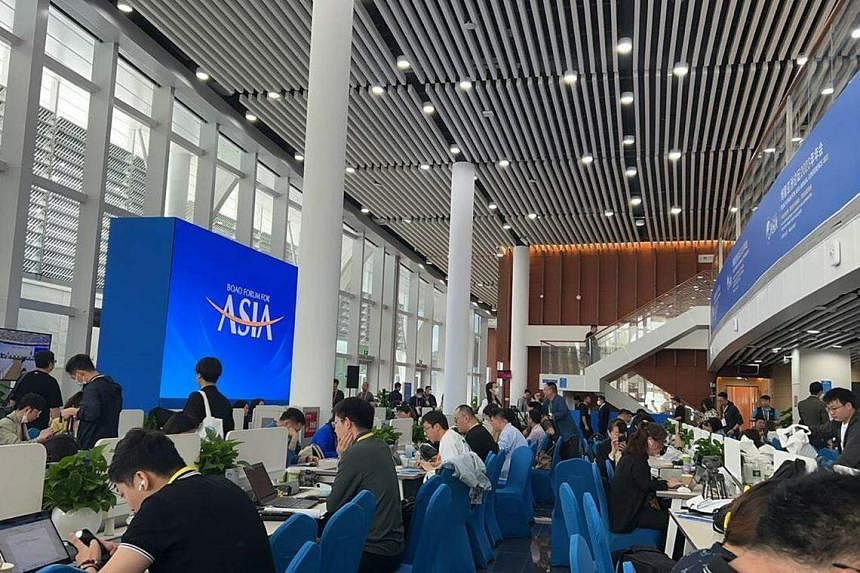BOAO, Hainan - At the Boao Forum for Asia, China’s biggest international conference since it lifted its strict zero-Covid policy in late 2022, the only physical reminders of the pandemic are the masks worn by staff, and booths offering alcohol wipes and masks that participants have largely ignored.
Even the word “Covid-19” barely appears on the agenda of the four-day forum, which focuses on Asia’s development challenges.
Only one panel discussion on the pandemic, “Ending the Covid-19 Pandemic”, is being held this year, compared with 2022, when the entire forum was headlined “The World in Covid-19 & Beyond: Working Together for Global Development and Shared Future”.
This year’s theme is “An Uncertain World: Solidarity and Cooperation for Development Amid Challenges”.
The number of in-person attendees this year has also rebounded to some 2,000 people – similar to levels before the pandemic.
Participants are no longer limited to closed-loop “bubbles” – a sharp change from 2022 and 2021 – and they are allowed to traverse beyond their designated hotels and the convention centre during the forum that ends on Friday.
In 2020, the annual forum, named after a town in China’s southernmost Hainan province, was cancelled for the first time in its 22-year history due to the pandemic.
The high-profile forum’s relaxed restrictions and strong showing this year, coupled with the local media hype and crowded conference halls, send an unmistakable signal that China is back in business after three years of border closures, strict quarantines, mass testing and flash lockdowns.
It is a message that Beijing has been broadcasting since China held its closely watched annual parliamentary meetings earlier in March, when outgoing Premier Li Keqiang announced that the world’s second-largest economy is gunning for a solid recovery in 2023, promising to roll out policies to spur growth, especially in domestic demand.
In 2022, China missed its stated target of around 5.5 per cent, growing 3 per cent after its strict zero-Covid measures severely hampered business activity, which also led to speculations that its economy was in trouble.
On Tuesday, the forum’s first day, organisers reinforced Mr Li’s message, releasing flagship reports that emphasised China’s role in leading global recovery, especially in Asia, where the economy is set to grow 4.5 per cent in 2023, up from the 4.2 per cent in 2022, according to estimates by the International Monetary Fund (IMF).
Global growth for 2023 is forecast by the IMF to be a low 2.9 per cent, on the back of weakened external demand and inflation concerns.
Chinese economists said in a media interview on Tuesday that the IMF’s upwards revision for Asia in 2023 was primarily due to China’s reopening, which will have “vast economic benefits for the region”.
Dr Xu Xiujun, director of the International Political Economy Research Office at the Institute of World Economics and Politics, a government think-tank, said that China’s commitment to propping up global growth is an “example of how China aims to be a force for certainty amid the challenges that have hampered global recovery”.
“We hope to inspire confidence in the global recovery through China’s stability,” he said.
Since the first day of the forum, there has been a buzz in the halls where panel discussions, roundtable talks and interviews are held, as journalists scamper from one venue to another, hoping to get a coveted spot to attend the events. It is the first time since the pandemic started in late 2019 that all events are being held in person.
Queues for some events filled up at least an hour before the start time, and reporters even had to fight for a spot at the nearby media centre where the talks were streamed live.
Business leaders, heads of think-tanks and academics have packed their schedules to attend talks, with topics ranging from how global supply chains are being shifted as tensions between the United States and China continue to rise, to opportunities that China’s Belt and Road Initiative (BRI) can provide.
The BRI, which was unveiled in 2013, is President Xi Jinping’s signature foreign policy initiative that aims to link China to the rest of the world through a network of ports, roads and railways that the country helps fund to build.
Mr Jacob Hook, managing partner of consulting firm Oliver Wyman, is attending the forum for the first time. He told The Straits Times that the discussions he attended, especially those on supply chains, have been helpful for his work. The turn-out has also been bigger than expected, with much optimism in the discussions.
“There is a can-do spirit in the air despite the uncertainty in the global environment,” said Mr Hook, who is based in Sydney.
The crowds are set to be bigger on Thursday morning, when new Chinese Premier Li Qiang delivers his first address to his largest international audience yet. More delegates, including foreign government leaders such as Singapore Prime Minister Lee Hsien Loong, are due to attend the forum.
Mr Li Qiang has been meeting foreign leaders, including IMF managing director Kristalina Georgieva, since Wednesday afternoon.
In his speech, the Premier is expected to provide more details on how he plans to steer the Chinese economy on its path to recovery, and to reiterate China’s commitment to opening up in a move to woo foreign investors.


